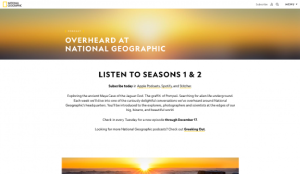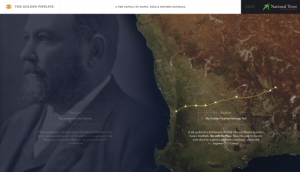Theme: Postcolonial Studies
Back to Top
|
 |
|
 |
|
The Fashion and Race Database Project
|
Social studies |
|
Fashion is one of the most visible ways that identity, culture, and cultural memory can be expressed on an everyday basis, both in contemporary and historical times. The Fashion and Race Database Project examines the intersections between fashion, race, and the legacies of colonialism. Describing itself as "an online platform filled with open-source tools that expand the narrative of fashion history and challenge mis-representation within the fashion system," this project was initiated by its director, Kimberly M. Jenkins, who is also a lecturer at Parsons School of Design and a visiting assistant professor at the Pratt Institute. Visitors to the project should begin by reading its Vision Statement & Purpose (under About) for an overview. In the Articles & Studies section, readers will find written pieces on topics such as representation, the politics of clothing and appearance, and reviews of relevant exhibitions and runway shows. The project also has a Resource Library, where readers will find links to a selection of scholarly books, more than 30 videos of lectures and panel discussions, and a directory of other organizations, projects, and blogs whose work is relevant to this project. For readers interested in postcolonial cultural studies, the Fashion and Race Database Project may be a helpful resource. [JDC] |
|





|
|
 |
|
Postcolonial Space
|
Social studies |
|
Students and scholars of postcolonialism, as well as the generally curious, may be interested in Postcolonial Space, a site that aims "to offer free and open information on all aspects of postcolonial studies." Begun in 2002 as its founder Dr. Masood Raja's personal website, Postcolonial Space launched in its current incarnation in 2007 and has continued evolving since then. Here, visitors will find an array of resources on postcolonial studies with a particular emphasis on literature. Those new to this subject may like to begin by reading "What is Postcolonial Studies?" (found on the Postcolonial Space Blog). In the Postcolonial Resources section, visitors will find numerous items of interest, such as an extensive list of authors from postcolonial cultures (organized by geographic region), a PhD reading list for graduate students, and links to other websites and organizations that focus on postcolonial studies. The Digital Library section also has much to offer, including a glossary and webinars discussing topics such as Terry Eagleton's book Literary Theory. In addition to running Postcolonial Space, Raja is the editor of Pakistaniaat: A Journal of Pakistan Studies and an associate professor of English at the University of North Texas. His course syllabi are available under Postcolonial Courses. [JDC] |
|





|
|
 |
|
Teaching Decolonization Resource Collection
|
Social studies |
|
History educators, scholars, and students who are interested in postcolonialism and decolonization may want to check out the Teaching Decolonization Resource Collection, a project of the National History Center in Washington, DC. Officially launched in March 2018, this project "is, in part, an outgrowth of the National History Center's decade-long International Decolonization Seminar." Here, visitors will find "a range of materials to support the study of decolonization in the classroom." This includes numerous bibliographies of primary and secondary sources that can be browsed by theme (e.g. culture, nationalism, politics) or by region (e.g. Africa, Americas, Pacific). Each well-organized bibliography includes a brief annotation and a link to the resource, some of which are available for free. On the project's main page under Educational Materials, readers will find a collection of downloadable Sample Syllabi contributed by college-level educators on topics such as "Comparative Colonialisms: Asia and Africa" and "Gender, Sexuality, and Decolonization in the Global South." Those seeking an overview of this field of study will find links to three introductory publications under What Is Decolonization?, while those looking for supplementary materials will find an annotated list of relevant articles and books under Further Reading. [JDC] |
|





|
|
 |
|
Wasafiri
|
Language Arts |
|
Since its launch in 1984, the literary magazine Wasafiri has "encourage[d] readers and writers to travel the world via the word." With its focus on international contemporary writing, Wasafiri set out to cover "writers from African, Caribbean, Asian and Black British backgrounds who often struggled to get adequate attention in the mainstream press." While print and Kindle editions of this magazine are available for purchase, some of Wasafiri's content can be read online for free at the link above. From the homepage, visitors are able to access some of its most recent Featured pieces, such as an interview with Suhaiymah Manzoor-Khan about her debut poetry collection, Postcolonial Banter, and Alicia Mietus's short story, "Third Person Female," which won the Queen Mary University of London (QMUL) Wasafiri New Writing Prize 2019 for Fiction. Under the Read menu, visitors can explore the magazine's archive of content, organized topically into Fiction, Articles, and Poetry. Founded by its editor-in-chief Susheila Nasta, a professor of modern literature at QMUL, Wasafiri is co-published by Routledge and supported by funding from Arts Council England. [JDC] |
|





|
|

















